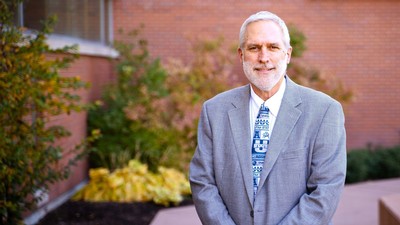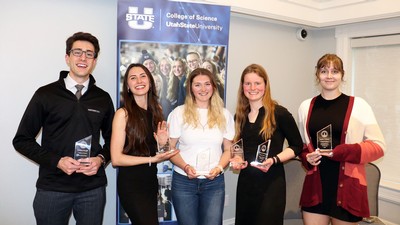USU Science Alum Receives Presidential Award for Teaching Excellence
With a Rubens' flame tube, USU alum Drew Neilson ’97, ’09 M.Ed., demonstrates acoustic standing waves in his Logan High physics classroom. Neilson is the recipient of a 2015 Presidential Award for Excellence in Mathematics and Science Teaching.
Helping students make discoveries for themselves and teaching science in a way “that makes sense” are guiding aims of Utah State University alum Andrew “Drew” Neilson, physics teacher and coach at Utah’s Logan High School.
Nielson is one of 108 teachers across the nation selected for a 2015 Presidential Award for Excellence in Mathematics and Science Teaching. He travels to Washington, D.C., later this summer to receive the honor in a formal ceremony.
“I am humbled to have been nominated and selected for the Presidential Award,” Neilson told Utah’s The Herald Journal newspaper. “This award is especially satisfying because it is focused on effective teaching in a student-centered classroom. It validates my career-long efforts to improve my teaching by learning from others, sharing my own innovations and continuing to research way to improve student performance and enjoyment in my physics classes.”
As a President Award recipient, Neilson receives a $10,000 cash award from the National Science Foundation.
The North Logan native, who earned a bachelor’s degree in physical science composite teaching in May 1997 and a master’s degree in education in 2009 from USU, teaches conceptual and advanced placement physics at Logan High. Since arriving at his current post in 2004, Neilson has grown the school’s physics program from 17 students to the current 230. Under his tutelage, the advanced placement exam pass rate has been nearly 90 percent.
Prior to teaching at Logan High, he taught math and physics at Idaho’s West Side High School in Dayton for eight years.
Neilson says his instruction at USU prepared him well for a high school teaching career.
“To teach well, you need to have a solid foundation in the subject you’re teaching,” he says. “I was prepared by renowned physicists at Utah State, who were leaders in their disciplines.”
Secondly, he says, aspiring teachers need to learn how to facilitate learning — and not just by delivering facts.
“We’re not books,” Neilson says. “The challenge of teaching is providing meaningful opportunities by which students can pursue hands-on experiments and experiences and make discoveries on their own.”
He lists faculty members Walt Saunders of physics, Kevin Hester of mathematics and statistics and Jan Bakker of English among his most memorable and influential undergraduate teachers at USU.
Faculty member Todd Campbell, formerly with USU’s School of Teacher Education and Leadership, Neilson says, was a “phenomenal” mentor during his graduate studies.
“Dr. Campbell instilled a teaching philosophy that has been my underlying goal — to help students understand not just ‘what’ is happening, but ‘why’ something is happening,” he says.
In addition to his efforts with Logan High’s high-achieving students, Neilson is among faculty members who’ve developed an intervention program aimed at students who are struggling academically.
“We rearranged the class schedule to provide extra mentoring and tutoring for at-risk students,” he says. “We’re encouraging students, especially incoming freshmen, to develop study habits that will benefit them throughout high school.”
Along with his current accolade, Neilson was honored with Logan High School’s Most Influential Teacher Award in 2012 and received the Teacher Recognition Award from the U.S. Presidential Scholars Program in 2009.
Related links:
Contact: Drew Neilson, Drew.Neilson@loganschools.org
Writer: Mary-Ann Muffoletto, 435-797-3517, maryann.muffoletto@usu.edu
USU alum Drew Neilson, a physics teacher and distance running coach at Utah's Logan High School, helps students with a science demonstration. The North Logan native says an important aim of teaching is to help students make discoveries on their own.
TOPICS
Awards 701stories Alumni 181storiesComments and questions regarding this article may be directed to the contact person listed on this page.








